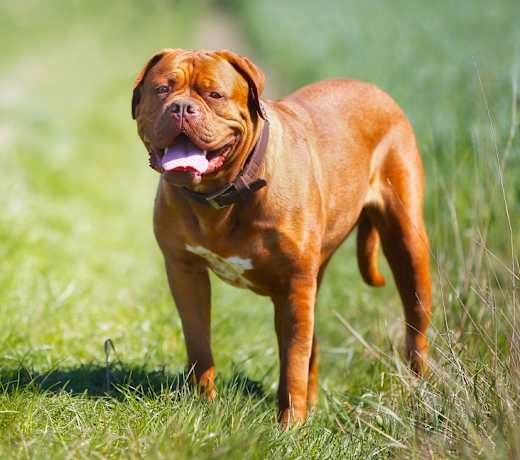You can adopt a Presa Canario at a much lower cost than buying one from a breeder. The cost of adopting a Presa Canario is around $300 in order to cover the expenses of caring for the dog before adoption. In contrast, buying Presa Canarios from breeders can be prohibitively expensive. Depending on their breeding, they usually cost anywhere from $1,300 to $7,000.
Adopt A Presa Canario
1 available Presa Canario near you
Sort by:
Any
Any
Any

CAPTAIN
Presa Canario
Male, 1 yr 5 mos
Chatsworth, CA
Color
Brindle
Size
(when grown) Large 61-100 lbs (28-45 kg)
Details
Spayed or Neutered
Story
1 - 1 of 1 pets available
Search for Presa Canario puppies and dogs
Find adoptable Presa Canario by Beverly Hills, CA
Presa Canario puppies near mePresa Canario in Agoura Hills, CAPresa Canario in Alhambra, CAPresa Canario in Anaheim, CAPresa Canario in Arcadia, CAPresa Canario in Artesia, CAPresa Canario in Azusa, CAPresa Canario in Baldwin Park, CAPresa Canario in Bell, CAPresa Canario in Bellflower, CAPresa Canario in Bell Gardens, CAPresa Canario in Brea, CAPresa Canario in Buena Park, CAPresa Canario in Burbank, CAPresa Canario in Calabasas, CAPresa Canario in Camarillo, CAPresa Canario in Carson, CAPresa Canario in Cerritos, CAPresa Canario in Commerce, CAPresa Canario in Compton, CAPresa Canario in Covina, CAPresa Canario in Cudahy, CAPresa Canario in Culver City, CAPresa Canario in Cypress, CAPresa Canario in Diamond Bar, CAPresa Canario in Downey, CAPresa Canario in Duarte, CAPresa Canario in El Monte, CAPresa Canario in El Segundo, CAPresa Canario in Fullerton, CAPresa Canario in Gardena, CAPresa Canario in Garden Grove, CAPresa Canario in Glendale, CAPresa Canario in Glendora, CAPresa Canario in Hawaiian Gardens, CAPresa Canario in Hawthorne, CAPresa Canario in Hermosa Beach, CAPresa Canario in Huntington Beach, CAPresa Canario in Huntington Park, CAPresa Canario in Inglewood, CAPresa Canario in La Canada Flintridge, CAPresa Canario in La Habra, CAPresa Canario in La Habra Heights, CAPresa Canario in Lakewood, CAPresa Canario in La Mirada, CAPresa Canario in La Palma, CAPresa Canario in La Puente, CAPresa Canario in Lawndale, CAPresa Canario in Lomita, CAPresa Canario in Long Beach, CAPresa Canario in Los Alamitos, CAPresa Canario in Los Angeles, CAPresa Canario in Lynwood, CAPresa Canario in Malibu, CAPresa Canario in Manhattan Beach, CAPresa Canario in Maywood, CAPresa Canario in Monrovia, CAPresa Canario in Montebello, CAPresa Canario in Monterey Park, CAPresa Canario in Moorpark, CAPresa Canario in Norwalk, CAPresa Canario in Palos Verdes Estates, CAPresa Canario in Paramount, CAPresa Canario in Pasadena, CAPresa Canario in Pico Rivera, CAPresa Canario in Pomona, CAPresa Canario in Rancho Palos Verdes, CAPresa Canario in Redondo Beach, CAPresa Canario in Rolling Hills Estates, CAPresa Canario in Rosemead, CAPresa Canario in San Dimas, CAPresa Canario in San Fernando, CAPresa Canario in San Gabriel, CAPresa Canario in San Marino, CAPresa Canario in Santa Clarita, CAPresa Canario in Santa Fe Springs, CAPresa Canario in Santa Monica, CAPresa Canario in Seal Beach, CAPresa Canario in Sierra Madre, CAPresa Canario in Signal Hill, CAPresa Canario in Simi Valley, CAPresa Canario in South El Monte, CAPresa Canario in South Gate, CAPresa Canario in South Pasadena, CAPresa Canario in Stanton, CAPresa Canario in Temple City, CAPresa Canario in Thousand Oaks, CAPresa Canario in Torrance, CAPresa Canario in Walnut, CAPresa Canario in West Covina, CAPresa Canario in West Hollywood, CAPresa Canario in Westlake Village, CAPresa Canario in Westminster, CAPresa Canario in Whittier, CA
Animal shelters near Beverly Hills, CA
Dog shelters near meDog shelters in Agoura HillsDog shelters in AlhambraDog shelters in AnaheimDog shelters in ArcadiaDog shelters in ArtesiaDog shelters in AzusaDog shelters in Baldwin ParkDog shelters in BellDog shelters in BellflowerDog shelters in Bell GardensDog shelters in BreaDog shelters in Buena ParkDog shelters in BurbankDog shelters in CalabasasDog shelters in CamarilloDog shelters in CarsonDog shelters in CerritosDog shelters in CommerceDog shelters in ComptonDog shelters in CovinaDog shelters in CudahyDog shelters in Culver CityDog shelters in CypressDog shelters in Diamond BarDog shelters in DowneyDog shelters in DuarteDog shelters in El MonteDog shelters in El SegundoDog shelters in FullertonDog shelters in GardenaDog shelters in Garden GroveDog shelters in GlendaleDog shelters in GlendoraDog shelters in Hawaiian GardensDog shelters in HawthorneDog shelters in Hermosa BeachDog shelters in Huntington BeachDog shelters in Huntington ParkDog shelters in InglewoodDog shelters in La Canada FlintridgeDog shelters in La HabraDog shelters in La Habra HeightsDog shelters in LakewoodDog shelters in La MiradaDog shelters in La PalmaDog shelters in La PuenteDog shelters in LawndaleDog shelters in LomitaDog shelters in Long BeachDog shelters in Los AlamitosDog shelters in Los AngelesDog shelters in LynwoodDog shelters in MalibuDog shelters in Manhattan BeachDog shelters in MaywoodDog shelters in MonroviaDog shelters in MontebelloDog shelters in Monterey ParkDog shelters in MoorparkDog shelters in NorwalkDog shelters in Palos Verdes EstatesDog shelters in ParamountDog shelters in PasadenaDog shelters in Pico RiveraDog shelters in PomonaDog shelters in Rancho Palos VerdesDog shelters in Redondo BeachDog shelters in Rolling Hills EstatesDog shelters in RosemeadDog shelters in San DimasDog shelters in San FernandoDog shelters in San GabrielDog shelters in San MarinoDog shelters in Santa ClaritaDog shelters in Santa Fe SpringsDog shelters in Santa MonicaDog shelters in Seal BeachDog shelters in Sierra MadreDog shelters in Signal HillDog shelters in Simi ValleyDog shelters in South El MonteDog shelters in South GateDog shelters in South PasadenaDog shelters in StantonDog shelters in Temple CityDog shelters in Thousand OaksDog shelters in TorranceDog shelters in WalnutDog shelters in West CovinaDog shelters in West HollywoodDog shelters in Westlake VillageDog shelters in WestminsterDog shelters in Whittier
Adopting a Presa Canario
Frequently asked questions about acquiring an Presa Canario - the pros and cons of adopting versus going through a breeder, and associated costs.
The easiest way to adopt a Presa Canario would be through a rescue that specializes in Presa Canarios. A great place to start would be to start a breed search on Adopt a Pet. The search will show you all the available Presa Canarios in your area.



